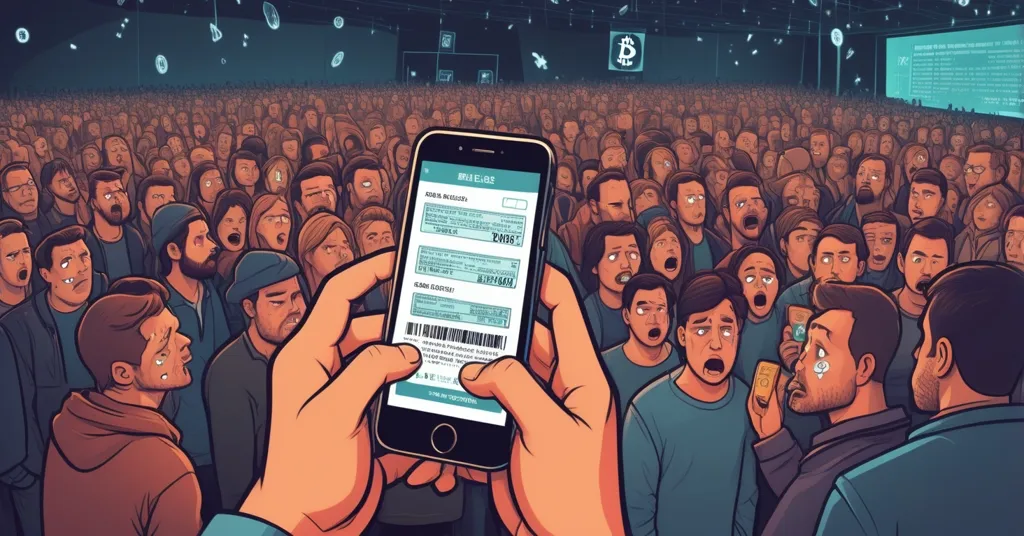IRS $1,390 Stimulus Check Hoax Debunked: 2023 Update and Bitcoin’s Rising Appeal

Debunking the $1,390 IRS Stimulus Check Hoax: 2023 Update and the Bitcoin Connection
Rumors of a juicy $1,390 stimulus check from the IRS dropping this summer have set social media on fire, fueling hopes of financial relief for struggling Americans. Before you start counting those imaginary dollars, let’s slice through the hype and lay bare the cold, hard facts about this viral claim.
- No Checks on the Way: The IRS has flat-out denied issuing any new stimulus payments, including the rumored $1,390, this year.
- Rumor Mill Exposed: Platforms like TikTok, Reddit, and Twitter are spreading unverified nonsense faster than a wildfire.
- Stalled Legislation: Senator Josh Hawley’s rebate proposal offers a glimmer of hope, but it’s dead in the water for now.
- Crypto Relevance: Economic distrust from such fiascos drives curiosity toward Bitcoin and decentralized solutions.
The $1,390 Stimulus Check Rumor: What’s the Buzz?
Across the digital landscape, whispers of a new IRS stimulus check worth $1,390 have exploded into a full-blown frenzy. TikTok videos rack up views with promises of instant cash, Reddit threads debate eligibility, and Twitter posts claim it’s a done deal for low- and middle-income folks. With inflation biting hard and wallets feeling lighter than ever, it’s no shock that such a rumor has legs—people are desperate for a lifeline. But let’s not get sucked into the echo chamber. The harsh truth is that no such payment exists, and the IRS isn’t playing Santa Claus this summer. This isn’t speculation; it’s straight from the horse’s mouth, with the agency issuing a no-nonsense statement to shut down the hype. For a deeper look into these unfounded claims, check out the truth behind these viral reports.
IRS Sets the Record Straight: No New Payments
The Internal Revenue Service has been crystal clear: there are no new stimulus checks, economic impact payments, or whatever you want to call them, coming in 2023. Their official stance leaves no room for misinterpretation. “Taxpayers will not receive new stimulus checks of any amount this summer,” they’ve declared, hammering the point home for anyone still clinging to hope. Why the firm denial? It’s simple—stimulus payments aren’t a whim or a bureaucratic giveaway. They require explicit Congressional legislation to authorize funding and distribution. We’ve seen this before with heavyweight acts like the CARES Act of 2020, detailed in this comprehensive overview, the American Rescue Plan Act of 2021 during the COVID-19 crisis, and even the Economic Stimulus Act of 2008 amid the financial crash. Without a new law passed by both the Senate and House, then signed by the President, the IRS and Treasury Department—via its payment arm, the Bureau of the Fiscal Service—can’t legally touch a dime for such purposes. So, if you’re expecting that $1,390 to land in your account, you’re betting on a fantasy.
“Taxpayers will not receive new stimulus checks of any amount this summer.” – IRS Official Statement
Just to tie up any loose ends, let’s address recent IRS activity that might’ve muddied the waters. Earlier this year, the agency dished out roughly $2.4 billion tied to unclaimed Recovery Rebate Credits, which are essentially catch-up payments for missed COVID-era stimulus due to tax filing hiccups. The max payout was $1,400 per person, but here’s the catch: you had to file your 2021 tax return by April 15, 2023, to claim it. Miss that deadline, and you’re out of luck. This has zero connection to the $1,390 rumor and isn’t an ongoing program. Anyone claiming otherwise is either clueless or peddling lies. Curious if this specific rumor holds any water? Check this fact-checking resource for clarity.
Hawley’s Proposal: Dead in the Water?
So, where did this magical $1,390 number even come from? The rumor seems to be a mangled take on a proposed bill by Missouri Republican Senator Josh Hawley, titled the American Worker Rebate Act. Introduced in late July, this legislation pitches tax rebates starting at $600 per person, with extra for dependents, funded by revenues from tariffs tied to the Trump administration’s trade policies. Hawley’s framing is pure populist fire: he wants to redirect wealth back to everyday Americans battered by economic shifts. Individuals earning under $75,000 a year would get the full amount, with phased-out sums for higher earners. Sounds like a sweet deal, right? Well, don’t pop the champagne just yet. For the latest on this legislation, see the official bill status.
“Like President Trump proposed, my legislation would allow hard-working Americans to benefit from the wealth that Trump’s tariffs are returning to this country. Americans deserve a tax rebate.” – Senator Josh Hawley
The bill is currently gathering cobwebs in the Senate Committee on Finance after being read twice on the floor. No votes, no amendments, no progress. Getting a bill through Congress is a slog under the best conditions—think passing both chambers, surviving partisan bickering, and landing on the President’s desk for a signature. Add in today’s political gridlock, and the odds of seeing actual checks anytime soon are, frankly, laughable. We’re talking ice-age laughable. Even if it somehow passes, it won’t be the instant cash splash social media hypes it up to be. This is a long game, not a quick fix. Stay updated on Hawley’s proposal through this detailed breakdown.
Social Media’s Misinformation Machine
How does a baseless claim like this snowball into a viral sensation? Welcome to the dark underbelly of social media, where platforms like TikTok, Reddit, and Twitter thrive on clicks over credibility. Algorithms on these sites are built to boost engagement, not accuracy, so a juicy headline about “free money” spreads faster than gossip at a high school reunion. A half-baked post about a stimulus check can rack up millions of views before anyone bothers to fact-check. With economic hardship hitting hard—think inflation rates hovering around 3-5% and cost-of-living pressures squeezing households—vulnerable folks are primed to believe anything that smells like relief. Community chatter has called out this mess, as seen in this discussion on rampant misinformation, pointing out how these platforms could curb falsehoods but often don’t, prioritizing profit over truth. Let’s not mince words: it’s a cesspool of hype, and the $1,390 rumor is just the latest turd floating to the top.
Worse yet, this kind of digital wildfire opens the door for scammers. Expect phishing emails, fake “claim your check” websites, and dodgy texts promising to fast-track your payment for a small “fee.” These parasites thrive on desperation, and this rumor is a goldmine for them. Want to stay safe? Stick to official sources like IRS.gov or Congress.gov for updates, and don’t click on anything that smells fishier than a week-old tuna sandwich. Digital literacy isn’t just a buzzword—it’s your first line of defense. For more community insights on this hoax, take a look at this Reddit thread debunking the rumor.
Economic Desperation and Crypto’s Appeal
Zooming out, this stimulus hoax isn’t just a standalone blip; it reflects a deeper erosion of trust in traditional financial systems. When rumors of government aid flop and centralized promises fall flat, people start looking elsewhere for stability. Enter Bitcoin and the broader crypto space. Historical data tells a compelling story: during the 2020 stimulus drops under the CARES Act, Bitcoin saw notable price spikes—think a jump from around $7,000 in April to over $9,000 by June, per CoinDesk archives—as recipients parked their relief funds in digital assets rather than watch fiat erode under inflation. It’s not hard to see why. With savings accounts offering pitiful interest rates and the dollar’s purchasing power shrinking, Bitcoin’s promise as a decentralized store of value starts looking mighty attractive. For a deeper dive into this trend, explore this study on Bitcoin adoption during economic uncertainty.
But let’s not slap rose-colored glasses on this. Bitcoin isn’t a magic wand for economic woes. Its volatility can gut-punch the unprepared—price swings of 10-20% in a week aren’t uncommon—and accessibility barriers like tech know-how or wallet security keep many on the sidelines. Still, the hunger for financial sovereignty, which Bitcoin embodies through self-custody and permissionless transactions, is real. And it’s not just about BTC. Altcoins and other blockchains like Ethereum play their own roles, filling niches Bitcoin doesn’t touch. Ethereum’s smart contracts, for instance, power decentralized apps and could underpin innovative financial tools. The crypto ecosystem is a messy, diverse beast, and that’s part of its disruptive strength.
Blockchain as a Stimulus Solution: A Futuristic Fix?
Let’s push the envelope further and imagine a world where blockchain tech overhauls how stimulus payments are handled. Picture this: instead of bureaucratic black holes and endless delays, governments distribute aid via a transparent, immutable ledger. Payments go direct to recipients, tracked in real-time, slashing fraud and cutting out shady middlemen. No more “lost checks” or questionable rollouts—just pure, verifiable transfers. Bitcoin’s Lightning Network could enable instant, low-cost transactions, while Ethereum’s smart contracts could automate eligibility checks. Heck, look at Estonia’s e-governance model—they’ve been using blockchain principles for secure digital services since 2016. Why can’t stimulus distribution get the same glow-up?
Of course, there’s a flip side. Scalability is a beast—Bitcoin processes about 7 transactions per second compared to Visa’s thousands—and regulatory minefields could choke innovation faster than you can say “SEC.” Plus, not everyone’s ready to swap their bank app for a crypto wallet. Still, in the spirit of effective accelerationism, let’s champion pushing these boundaries. If centralized systems keep fumbling the ball with phantom checks and red tape, decentralized tech could sprint past them, delivering solutions that actually work.
Lessons for a Decentralized Future
The $1,390 IRS stimulus check rumor is a textbook case of hope clashing with reality. It’s a wake-up call to question everything you scroll past online and dig into primary sources before buying the hype. It also lays bare the inefficiencies of centralized financial systems that leave people grasping at straws—or fake checks—for relief. Until Congress pulls its head out of the sand, no new payments are coming, and even if Hawley’s American Worker Rebate Act defies the odds, it’s not the overnight jackpot TikTok promises. Meanwhile, let’s keep pushing for real change, whether that’s smarter legislation or blockchain-powered systems that cut through the mess. Economic uncertainty isn’t going anywhere, but neither is the drive to build a freer, more autonomous financial frontier.
Key Takeaways and Questions Answered
- Is there any truth to the $1,390 IRS stimulus check rumor in 2023?
No, the IRS has firmly stated no new stimulus payments are authorized or being issued this year, as no federal legislation supports such a program. - What is Senator Josh Hawley’s American Worker Rebate Act proposal?
It’s a bill introduced in July 2023 proposing tax rebates starting at $600 per person, funded by Trump-era tariffs, but it’s stalled in the Senate Committee on Finance with no progress. - Has the IRS distributed any recent stimulus payments?
Yes, earlier in 2023, they sent out $2.4 billion for unclaimed 2021 Recovery Rebate Credits, up to $1,400 per person, but eligibility ended on April 15, 2023. - Why can’t the IRS issue new stimulus checks without Congressional approval?
Stimulus payments require explicit legislation from Congress to authorize funding, as seen in laws like the CARES Act of 2020 and the Economic Stimulus Act of 2008. - How does economic uncertainty fuel rumors like the $1,390 stimulus check hoax?
Rising inflation and cost-of-living pressures make Americans desperate for relief, leaving them vulnerable to unverified claims of aid on social media. - What’s the connection between stimulus rumors and Bitcoin adoption?
Distrust in traditional finance, amplified by unfulfilled stimulus hopes, drives interest in Bitcoin as an inflation hedge, as seen with price spikes during 2020 stimulus drops. - How could blockchain technology improve stimulus distribution?
Blockchain offers a transparent, immutable ledger for direct payments, reducing fraud and delays, potentially revolutionizing how governments handle financial aid.



